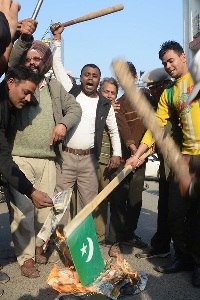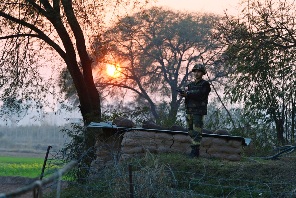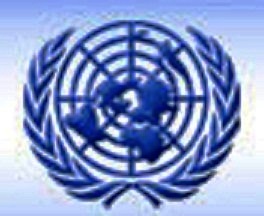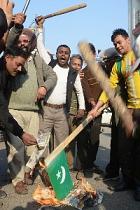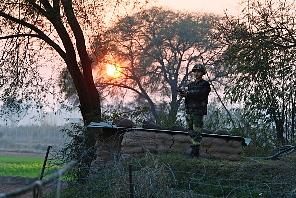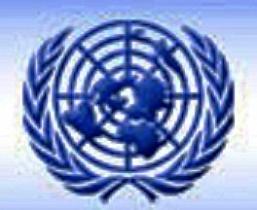Kashmir: United Nations raps out its role
Head of the United Nations Military Observers Group (UNMOG) Major General Hernann Loidolt, in a press conference in Srinagar (Capital city of Kashmir) stated that Kashmir was a tormented country and India and Pakistan were playing political games over it. Though there was no official comment on the statement from Pakistan but India criticized the remarks as "unwarranted and uncalled for". UNMOG has been monitoring cease-fire-line for the last sixty five years. In spite of regular skirmishes and violation of UN Resolutions UN has conducted itself maintaining its legitimate role to keep a vigil to avert any catastrophic eventuality. India stood exposed recently when it violated cease-fire-line and retaliatory action by Pakistan leading to a big row that, if allowed to escalate, could lead to a full-scale nuclear war.
India and Pakistan (PTI January 22, 2013) got into a verbal exchange at United Nations Security Council when India stressed that the role of UNMOG has been overtaken by agreements between India and Pakistan under which differences are to be settled through "bilateral negotiations". United Nations, European Union and the powers that be on international level understand that India’s intentional and convenient version of "bilateral negotiations" is expected by India to culminate favourably and on Indian terms. A third party intervention to mediate, while acceptable to Pakistan, has always been scuttled by India making it feel very uneasy. India is not ready to face the ground reality and refuses to allow a free and impartial plebiscite as guaranteed by United Nations Security Council resolutions. It is widely known that India is keeping its grip on Kashmir using its military might but the question asked is; for how long?
Indian argument that mutually agreed upon "bilateral negotiations" by India and Pakistan negate the role of UN, a plea unilaterally and conveniently used by India to mislead the world community. United Nations, Pakistan and more importantly people of Kashmir do not recognise the validity of such negotiations, rejecting these as counter-productive, sinister and impossible to implement.
People of Kashmir have been giving sacrifices since the day Kashmir was occupied on October 26, 1947 and the number of people dead runs in tens of thousands, rapes, disappearances, and razed property worth billions. The Switzerland of Asia, as it is known, is turned into valley of death and majority of people are suffering from trauma and mental disorder.
After creation of Bangladesh, a defeated Pakistan under the premiership of ZA Bhutto sought the release of ninety thousand prisoners of war signed an agreement at Simla for peaceful resolution of Kashmir issue. The world body appreciated the move and hoped that the issue would now be resolved after so much of destruction and blood spilled on both sides. Little did the world know that India was only trying to gain time to ward off international pressure and at the same time consolidate its position in Kashmir militarily? The ongoing Indian recalcitrant and stubborn attitude led to an armed uprising by Kashmiri population; followed by teenage youth (2010) getting involved taking up stones and bricks to fight Indian army adding another over 150 young martyrs to already staggering number of more than one hundred thousand dead and buried.
The world has always been concerned about peaceful resolution of Kashmir issue as two hostile nuclear neighbours are emotionally governed by nostalgia and ingrained hatred which comes to the fore even when two nations fight it out on sporting fields. Keeping the history of fighting wars in view; a nuclear war surely averted after Mumbai attacks is a matter of serious concern needing immediate global attention. A third party intervention has become imperative and the political situation has never been as warranting as it is now.
In a meeting held in Brierfield, UK by MP’s, MEP’s, Lords and a sizeable number of Kashmiris; the resolve to support and work for an independent Kashmir occupied by three neighbouring countries India, Pakistan and China, was echoed and endorsed. Burnley Liberal Democrat MP Mr Gordon Birtwistle said: "Nobody across the free world would accept what is going on in Kashmir. Why would people in Kashmir have to put up with it? The independence is to be acquired by support from across the world". Pendle Conservative MP Andrew Stephenson pointed out he was just leaving secondary school when the 1999 visit took place and he added: "What I find more shocking is that since the visit 13 years ago, nothing much has changed." (pendletoday.co.uk: January 18, 2013).
The official position of United Kingdom has always been that India and Pakistan must resolve Kashmir issue and the wish of Kashmiris must be taken into account. The statement must not be interpreted as a negation of third party intervention and current political status quo as an accepted solution. An unprecedented humanitarian enigma remaining unanswered could bear dangerous consequences.
During UNSC open debate on peacekeeping organised by Pakistan; the argument by Indian Permanent Representative to the UN, Hardeep Singh Puri that UNMOG‘s role was "overtaken" by 1972 Simla Agreement was vehemently rejected by Pakistan’s Permanent Representative Masood Khan who stressed that UNMOG continues to monitor the cease-fire in accordance with Security Council Resolutions and its mandate is therefore fully valid, relevant, and operative. People of Kashmir, as is widely known, reject any agreement signed or agreed upon between the two hostile nations without any consultation or participation by Kashmiris or their popular leadership.
UN chief Ban Ki-Moon’s spokesperson Martin Nesirky in an email sent to PTI pointed out that the Secretary-General’s position has always been that the role of UNMOG in Kashmir can only be terminated by a decision of the Security Council by a 15-nation body. The United Nations Military Observer Group in India and Pakistan (UNMOG) was established in 1948 by the Security Council and currently there are 39 military observers in Kashmir, 25 international civilian personnel and 48 local civilian staff.
Comments
There are 0 comments on this post


